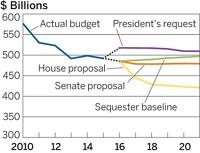Advertisement
Grab your lab coat. Let's get started
Welcome!
Welcome!
Create an account below to get 6 C&EN articles per month, receive newsletters and more - all free.
It seems this is your first time logging in online. Please enter the following information to continue.
As an ACS member you automatically get access to this site. All we need is few more details to create your reading experience.
Not you? Sign in with a different account.
Not you? Sign in with a different account.
ERROR 1
ERROR 1
ERROR 2
ERROR 2
ERROR 2
ERROR 2
ERROR 2
Password and Confirm password must match.
If you have an ACS member number, please enter it here so we can link this account to your membership. (optional)
ERROR 2
ACS values your privacy. By submitting your information, you are gaining access to C&EN and subscribing to our weekly newsletter. We use the information you provide to make your reading experience better, and we will never sell your data to third party members.
Policy
Looming Federal Budget Battles
Congress: House proposes a short-term budget extension with divisive caveats
by Andrea Widener
September 13, 2013
| A version of this story appeared in
Volume 91, Issue 37
With the start of the 2014 federal fiscal year just two weeks away, government funded researchers are bracing for yet another year of shifting budgets and financial uncertainties. In what has become standard practice over the past decades, Congress has run out of time to pass a complete budget through the normal process.
Republicans in the House of Representatives have proposed a bill that would avoid a government shutdown on Oct. 1, when the fiscal year starts, and keep the doors open until Dec. 15. But provisions linking the bill to defunding of President Barack Obama’s health care law and its failure to remove across-the-board cuts brought on by budget sequestration make the House proposal unlikely to pass in the Senate. That means the uncertainty is likely to continue for weeks, months, or even longer.
Jumping from budget crisis to budget crisis is bad for science, University of California Senior Vice President for External Relations Daniel M. Dooley wrote in a letter to lawmakers earlier this month. He encouraged them to return to the normal budgeting process. “Short-term budgeting, combined with the threat of future sequestration cuts, creates uncertainty, lost opportunities, and in some cases higher costs that can have damaging, long-term effects on California and the nation,” he wrote.
The Republican bill (H.J. Res. 59) would continue federal funding at the rate of $986 billion per year, slightly below the present funding level of $988 billion. That current number includes cuts mandated by sequestration, which slashed programs throughout government, including most federal science agencies. Federal employees have faced furloughs and program cuts, while academics have seen their grants slashed. In the past, Senate leaders have said they will not pass funding bills that include the sequestration cuts.
At C&EN press time, House leaders were trying to gather support for the continuing resolution, which had been scheduled for a vote by the full House this week. The Senate has not yet indicated its plans to deal with the budget deadline.




Join the conversation
Contact the reporter
Submit a Letter to the Editor for publication
Engage with us on Twitter